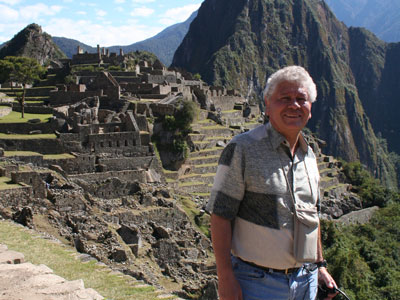Here at Mines, nearly everyone is an engineer. Professors are engineers, athletes are engineers, and even that cat that sits outside the CTLM is most likely an engineer. So it should come as no surprise that Spanish I professor Francisco Padilla, who was born and raised in Chihuahua, Mexico, even has some roots in the engineering field.
Padilla’s family originated in the tumultuous area of Juarez, Mexico, but later relocated to El Paso, Texas where a young Padilla finished his high school education. It was during these years that he began to develop a love for electrical engineering and began tinkering with the family’s electronic devices. “But that was before new technology,” Padilla recalled with a laugh. “I liked to take apart and work on radios and TV’s, but that was back when the old TV’s had bulbs. It was much easier to work on.”
The interest was sparked in Padilla, and after earning his high school diploma in El Paso, he then decided to pursue a higher education. Along with one of his high school friends, the future Spanish teacher continued his northern trek and enrolled in the University of Colorado in Boulder.
Padilla believed that this new school would be the place that he would hone his mathematics and engineering skills, but, little did he know, that he would soon leave engineering in the rearview mirror. Just after he arrived, he found a niche in the Spanish department and offered to tutor the Spanish students. It did not take him long to discover his hidden talent of teaching, as students were soon thanking Padilla and complimenting him on his ability to explain the material. They would often tell Padilla that he was much more effective and easier to understand than their current professor.
But the students were not the only ones to enjoy Padilla’s work. Padilla himself began to enjoy studying and teaching his native language. He soon decided to forgo his engineering future and change his undergraduate major to Spanish. Similarly to English majors, Padilla began to immerse himself in the Spanish language, studying the literary works of authors such as Carlos Fuentes, Martín Luis Guzmán, and Octavio Paz.
Padilla’s teaching career officially began in his junior year at the University of Colorado. He had already developed a reputation for his teaching ability and was asked to teach a Spanish class in just his third year of college. Soon after, in 1973, Padilla began to teach in and around the Denver Metro area at Metro State College, Red Rocks Community College, and the Community College of Denver.
As a teenager in El Paso, Padilla sacrificed his time working with juvenile delinquents. He began to see the effect that drugs and alcohol were having on young lives. “I saw a lot of problems. I saw that they brought a lot of problems to themselves and their families,” he said.
When Padilla moved to Colorado, he still helped the less fortunate. “While I was teaching at Metro and CCD, I knew of people in the community who wanted to learn the language but could not afford to pay the tuition. So, I opened up a private school for members of the community that couldn’t afford the tuition of a university.”
Padilla’s school has flourished since then, and now offers 11 different levels of Spanish as well as many other languages for those with English as their second language. “We can offer almost every language, as long as there is a demand for it,” he said.
For the past 18 years, Padilla has been a fixture in the International Department at Mines, offering courses in both Spanish I and Spanish II. He knows that he faces a challenge teaching Spanish at such an engineering-based school, but still says that the main difference in teaching Mines students is the average age of the students. “Students are a lot younger here. At Red Rocks, the students are between 25 and, well, 70. The environment is a little bit different, but really, students are students, no matter the age they are. I just try to make students feel as comfortable as I can.”
In his nearly 40 years of teaching, Padilla has worked to perfect his curriculum. “I have changed things through the years,” he said. “I remember learning English, the problems that I had. In my books, I try to make them the best that I can and help the students with some of those problems.”
Padilla may live in Colorado now, but there is no doubt that he still relishes his Spanish heritage. Between reading the works of Fuentes, Guzmán, and Paz, Padilla enjoys immersing himself in the archeology, anthropology and history of Spanish-speaking people. Every two years, Padilla takes a group of students from his school down to Peru to experience South American culture at places such as Machu Picchu, Lake Titicaca, and Coca Canyon.
It is this love of the Spanish culture that rubs off on his students, and makes Padilla an effective teacher. But no matter how effective he is, there are bound to be some mistakes. Padilla is aware of this, but urges his students that if they are embarrassed, not to use the phrase, “Estoy embarazado.”

